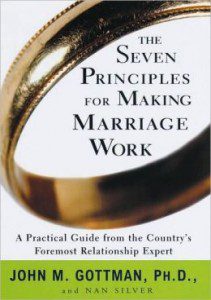 Today I will be presenting a workshop on John Gottman’s Seven Principles for Making Marriage Work at the 11th Annual National Native American “Fatherhood is Leadership” Conference in Mesa, Arizona, so I thought hat it would be a good idea to present a summary here.
Today I will be presenting a workshop on John Gottman’s Seven Principles for Making Marriage Work at the 11th Annual National Native American “Fatherhood is Leadership” Conference in Mesa, Arizona, so I thought hat it would be a good idea to present a summary here.
First of all, it is important to remember that these principles are based on John Gottman’s over 40 years of research on relationships and multidimensional and extensive observation of over 3000 couples. In the process, John observed what he came to call the Masters and Disasters of Relationship. From them he gleaned what works and doesn’t work in a relationship and distilled his Seven Principles for Making Marriage Work.
Second, the foundation of John Gottman’s Seven Principles for Making Marriage Work is friendship: “At the heart of my program is the simple truth that happy marriages are based on friendship. These couples tend to know each other intimately–they are well-versed in each other’s likes, dislikes, personality quirks, hopes and dreams. They have an abiding regard for each other and express their fondness not only in big ways but in little ways day in and day out” (Gotman & Silver, 1999).
1. Share Love Maps
The first of John Gottman’s Seven Principles for Making Marriage Work is Share Love Maps. Love Maps are that part of the brain where you store all the relevant information about your partner, i.e. their likes and dislikes, their hopes and dreams, their triumphs and traumas, etc. It is what we usually learn and share when we are dating or courting someone, and what we need to continue to learn and share when we are in a long-term relationship. According to Gottman, “Emotionally intelligent couples are intimately familiar with each other’s world” (Gottman & Silver, 1999).
2. Nurture Your Fondness & Admiration
The second of John Gottman’s Seven Principles for Making Marriage Work is Nurture Your Fondness & Admiration. This is the friendship basis of a relationship. According Gottman, “Fondness and admiration are two of the most crucial elements in a rewarding and long lasting relationship” (Gottman & Silver, 1999). The Masters of Relationship are truly fond of and admire each other and take time to nurture their fondness and admiration.
3. Turn Towards Each Other Instead of Away
The third of John Gottman’s Seven Principles for Making Marriage Work is Turn Towards Each Other Instead of Away. In a relationship, each partner makes “bids” for attention, affection, humor, or support. We can respond by turning towards those bids or turning away. According to Gottman, “Turning towards is the basis of emotional connection, romance, passion, and a good sex life” (Gottman & Silver, 1999). By turning towards, we establish what John Gottman calls “the Emotional Bank Account,” putting good will in the bank for a rainy day.
4. Let Your Partner Influence You
The fourth of John Gottman’s Seven Principles for Making Marriage Work is Let Your Partner Influence You. Remember, to have influence in a relationship, you must be willing to be influenced and to share power. This is especially important for men. According to John Gottman’s research: “When a man is not willing to share power with his partner, there is an 81 percent probability that his marriage will self-destruct” (Gottman & Silver, 1999).
5. Solve Your Solvable Problems
The fifth of John Gottman’s Seven Principles for Making Marriage Work is Solve Your Solvable Problems. All couples have problems. The difference between the Masters and Disasters of Relationship is how they manage their problems. According to Gottman, there are two types of problems: solvable and perpetual problems. Solvable problems, as the name suggests, can be resolved with the use of six skills for managing conflict, which include using Softened Startup, Repair and De-escalation, Physiological Self-Soothing, Accepting What You Cannot Change, Accepting Influence, and Compromise (these will be the subject of a future blog).
6. Overcome Gridlock
The sixth of John Gottman’s Seven Principles for Making Marriage Work is Overcome Gridlock. The second (and most predominant) type of problems are gridlocked, perpetual problems. These are the problems that you argue about again and again and where you hurt each other and feel like you are getting nowhere. According to Gottman: “The goal in ending gridlock is not to solve the problem, but rather to move from gridlock to dialogue. The gridlock conflict will probably always be a perpetual issue in your marriage, but one day you will be able to talk about it without hurting each other. You will learn to live with the problem” (Gottmn & Silver, 1999).
7. Create Shared Meaning
The last of John Gottman’s Seven Principles for Making Marriage Work is Create Shared Meaning. We are all philosophers, looking for meaning in life and our relationships. According to Gottman: “Marriage isn’t about just raising kids, splitting chores, and making love. It can also have a spiritual dimension that has to do with creating an inner life together–a culture rich with symbols and rituals, and an appreciation for your roles and goals that link you, that lead you to understand what it means to be part of the family you have become” (Gottman & Silver, 1999).
These Seven Principles for Making Marriage Work are what the Art & Science of Love Couples Workshop and A Roadmap for the Journey: A Gottman Workshop for Couples in Recovery teach.
Reference
Gottman, J., & Silver, N. (1999). The Seven Principles for Making Marriage Work. New York: NY: Three Rivers.
© 2025 Michael Brown, MSC, LMFT, dba Happy Couples Healthy Communities
